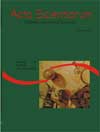<b>O conceito de poder na filosofia política de Marsílio de Pádua</b> - DOI: 10.4025/actascihumansoc.v25i2.2181
Resumen
Marsílio Mainardini, jurisconsulto e estudioso da política, nasceu em Pádua, Itália, por volta de 1280 e viveu até 1343. Filho de um notário da prestigiada Universidade Patavina, estudou Direito em sua cidade natal, notável centro da cultura jurídica da época. Ele foi grandemente influenciado pela filosofia aristotélica, fato que pode ser verificado em sua obra: Defensor pacis (1324) na qual expôs uma filosofia política delineada pelo esforço de construção de uma noção de Estado (ou governo) livre das arbitrariedades da corte pontifical de Roma (ou de Avinhão). Seu conceito de soberania do povo contribuiu grandemente para a laicização do Estado e do Poder, numa antecipação da Modernidade Política, construída a partir do século XVI. O texto enfoca mais detalhadamente seu conceito de poder por meio da análise do modelo de organização civil do Estado e também de seu repúdio às ingerências eclesiásticas sobre os governos civis. A edição do Defensor da paz aqui utilizada é a tradução brasileira de 1994Descargas
DECLARAÇÃO DE ORIGINALIDADE E DIREITOS AUTORAIS
Declaro que o presente artigo é original, não tendo sido submetido à publicação em qualquer outro periódico nacional ou internacional, quer seja em parte ou em sua totalidade.
Os direitos autorais pertencem exclusivamente aos autores. Os direitos de licenciamento utilizados pelo periódico é a licença Creative Commons Attribution 4.0 (CC BY 4.0): são permitidos o acompartilhamento (cópia e distribuição do material em qualqer meio ou formato) e adaptação (remix, transformação e criação de material a partir do conteúdo assim licenciado para quaisquer fins, inclusive comerciais.
Recomenda-se a leitura desse link para maiores informações sobre o tema: fornecimento de créditos e referências de forma correta, entre outros detalhes cruciais para uso adequado do material licenciado.


























